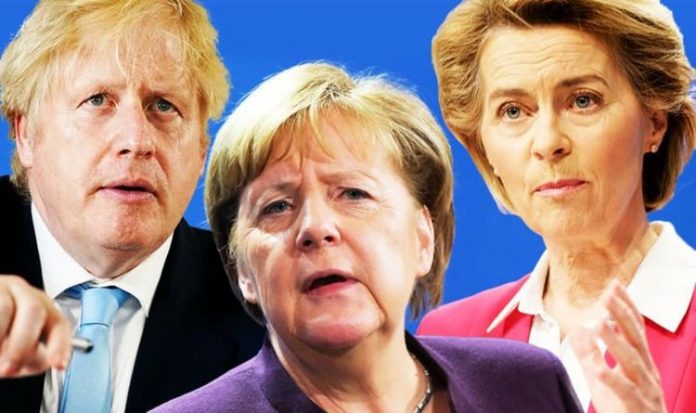Earlier this week, MPs voted on a controversial new bill published by the Government. The UK is currently in a transition period that keeps it bound to the EU’s rules until December 31. The two sides are trying to negotiate a new trade deal that would come into effect once this period ends, but talks have continued to be characterised by perpetual deadlock.
With less than five weeks to go, the Government is essentially seeking to prevent disruption to trade between the four nations of the UK if no deal is reached with the EU.
Downing Street described the Internal Market Bill as a “vital legal safety net”.
However, the move has enraged Brussels and prompted a fresh rebellion within the Conservative Party.
European Commission President Ursula von der Leyen has set Prime Minister Boris Johnson a three-week deadline to ditch his plans or face financial and trade sanctions, with the clear suggestion that negotiations over a future relationship will fail unless the most contentious parts of the proposed legislation are removed.
Speaking in Brussels yesterday, Ms von der Leyen said: “This withdrawal agreement took three years to negotiate and we worked relentlessly on it, line by line, word by word. And together we succeeded. And the result guarantees our citizens’ rights, financial interests, the integrity of the Single Market, and crucially the Good Friday Agreement.
“The EU and UK jointly agreed it was the best and only way for ensuring peace on the island of Ireland. We will never backtrack on that. This agreement has been ratified by this House and by the House of Commons.
“It cannot be unilaterally changed, disregarded or disapplied. This is a matter of law and trust and good faith.”
While it is true that if Mr Johnson went ahead with his plan, Britain would essentially break international law – a recent report by Steven Barrett, a Commercial Chancery barrister, reveals how Germany also recently broke international law but did not face any consequences.
Earlier this month, the German Constitutional Court ruled that the European Central Bank (ECB) public assets purchases programme ultra vires, meaning it was acting beyond its legal power.
JUST IN: German economist’s stark warning over no deal Brexit exposed
Mr Barrett wrote in a column for the Spectator: “What matters for our purposes now is that the EU have taken no steps to sanction or reprimand Germany.
“Certainly, no steps in law have been taken against them at all.
“Germany has not modified its constitution as a result, it has maintained its position in law.
“That makes it important as a matter of law; not merely as a matter of politics.”
The barrister explained that the case was that Germany, with its unimpugnable commitment to international law, found as a matter of principle that it can overturn international law (break it), if an international law obligation asked Germany to do something which was a fundamental breach of its constitution.
He noted: “Now, this is not the same as the other arguments and is not politics.
“This is going back to our practice of law.
“For 800 years when faced with a novel legal problem we have looked to previous cases to find the legal solution.
“When we look for previous cases to copy, it is normal to look to other countries – in my area involving complicated issues around money/trusts/equity we often look to Australia.
“It is true to say we do not look to civil law jurisdictions, which is what Germany is, quite so often. But I see nothing in principle wrong with looking to Germany for guidance on how the UK should both best honour international law and protect our constitution.
“These issues you see are about constitutional law. They are about how the UK treats our own constitution – about how we behave regarding international law. We have not looked at these questions for some time.”
Mr Barrett concluded saying that if Britain is to find a legal solution, then looking at an established western democracy who has “put more time and effort into its constitution” could be the best solution.
In practice, he added, that would mean that just like Germany, the UK will uphold international law in principle, but break international law if it conflicts fundamentally with its constitution.







